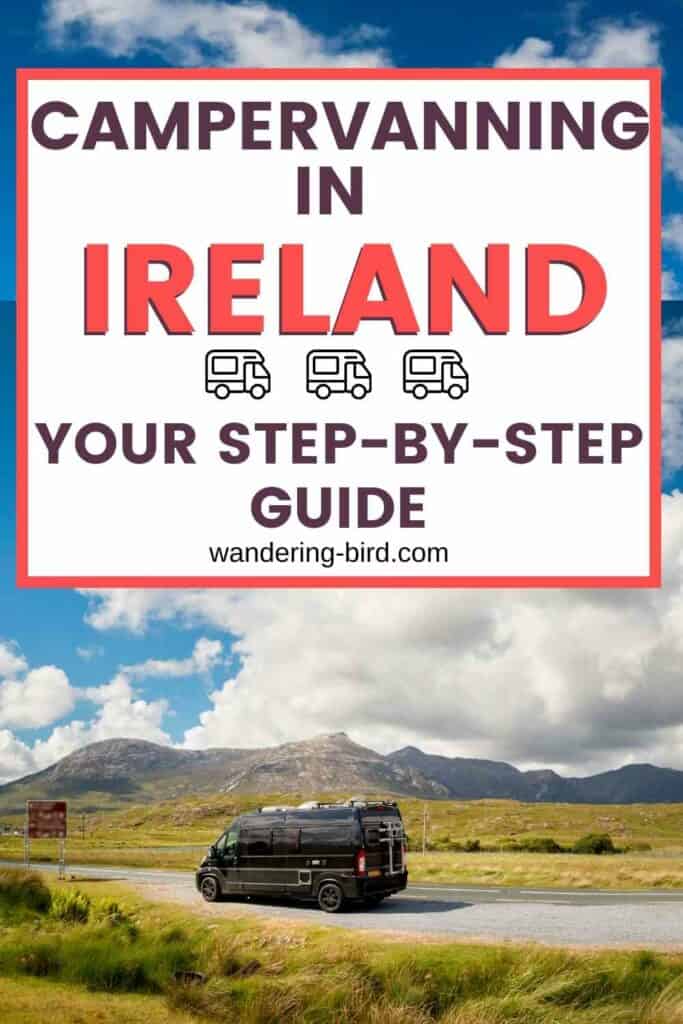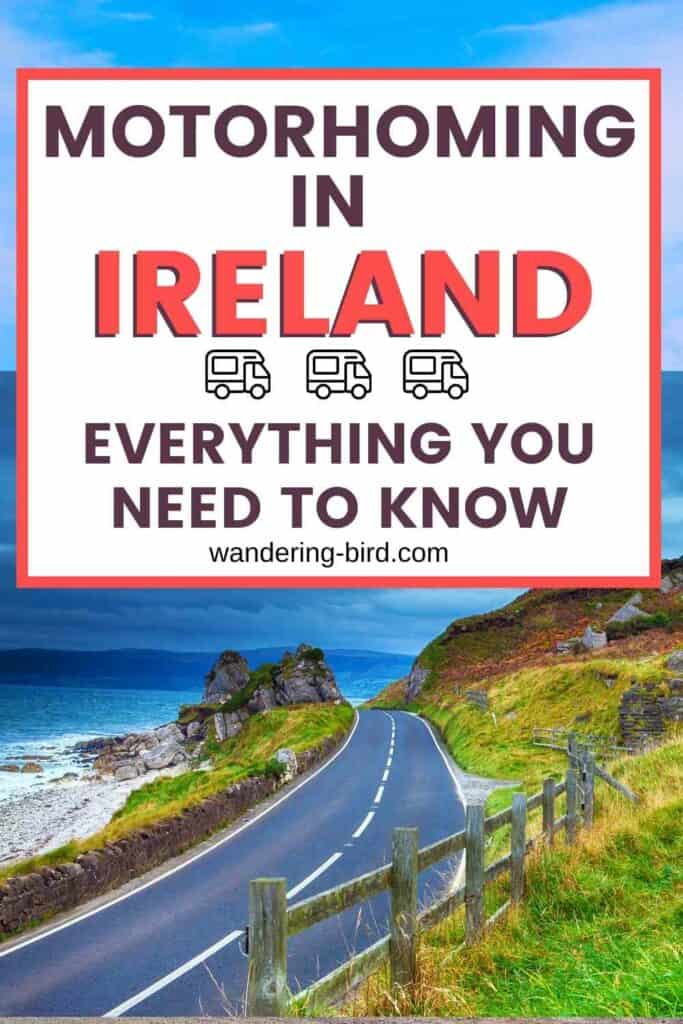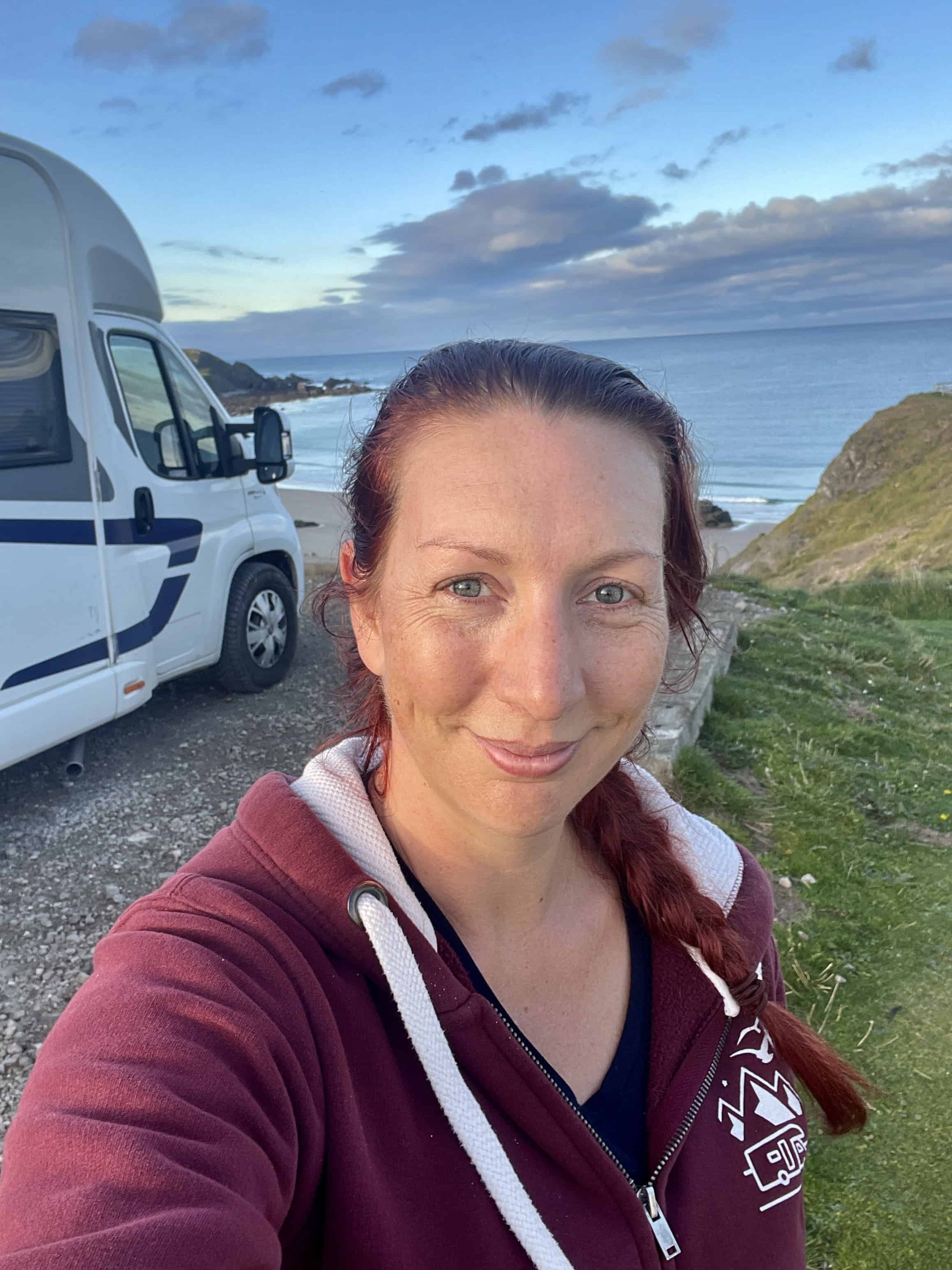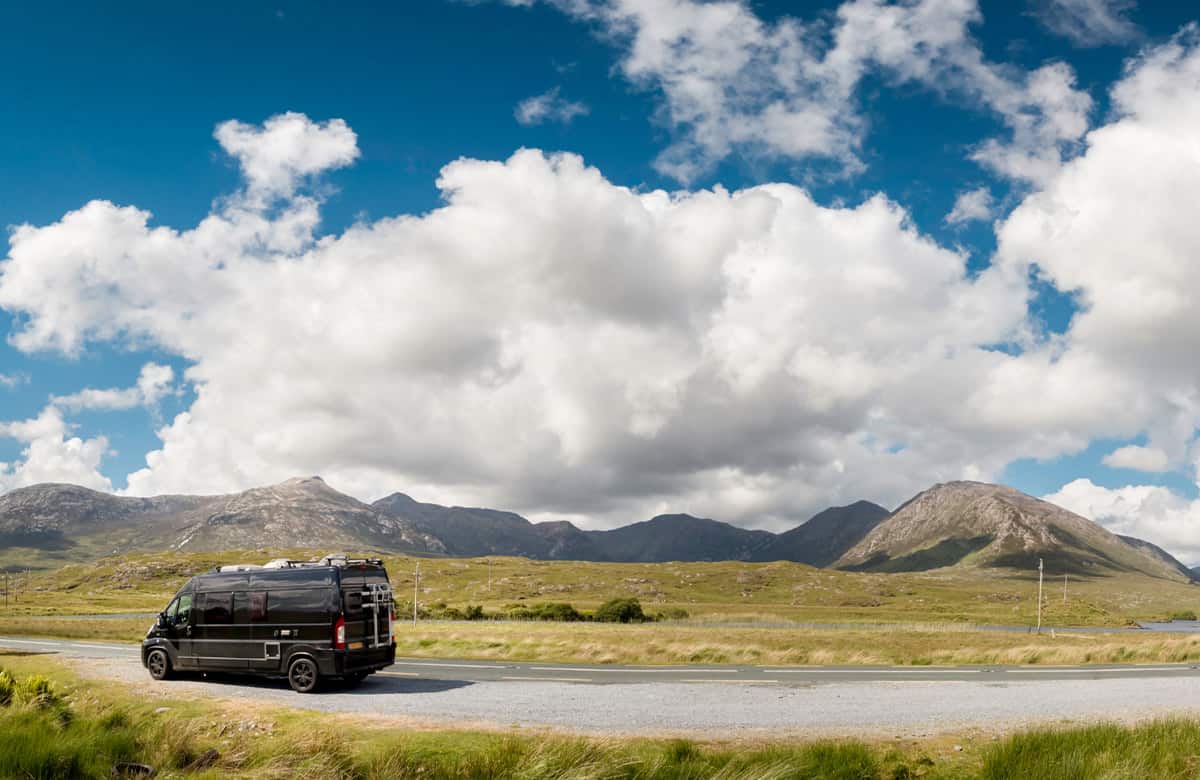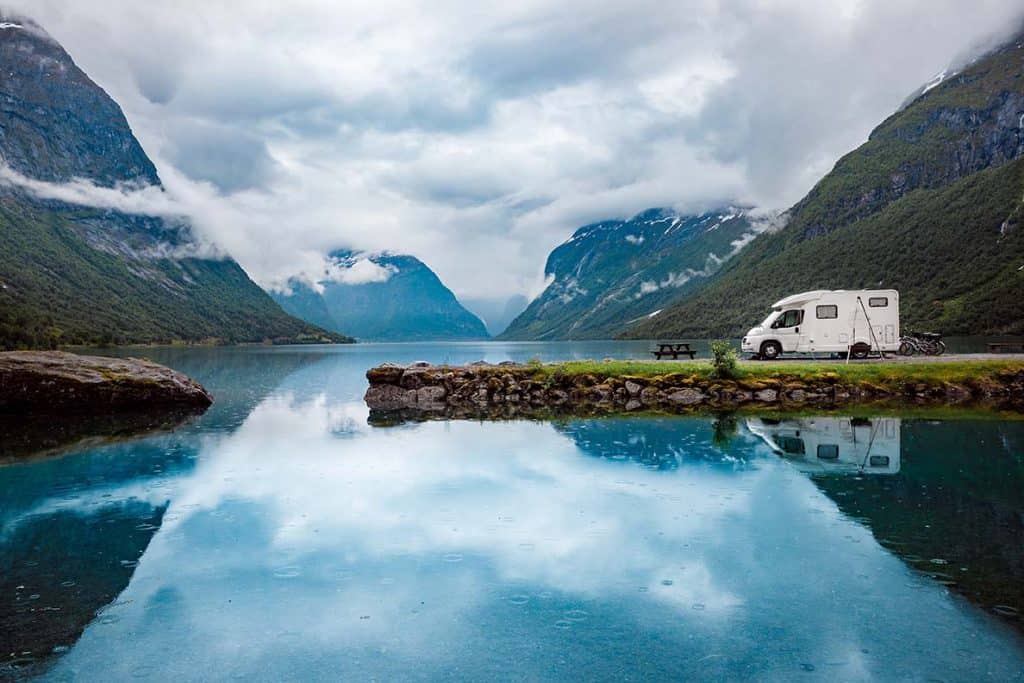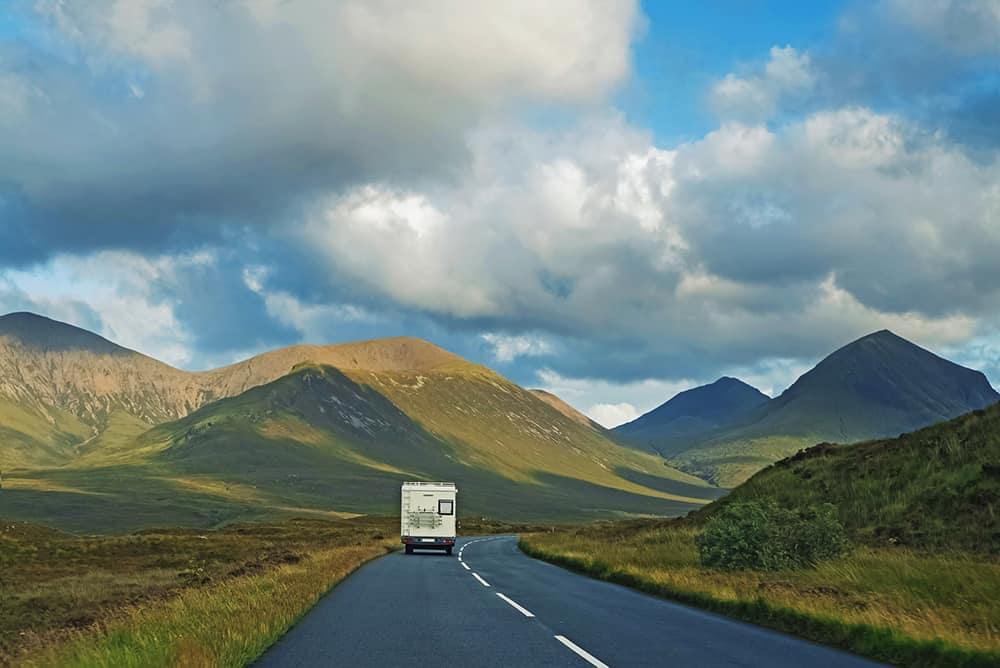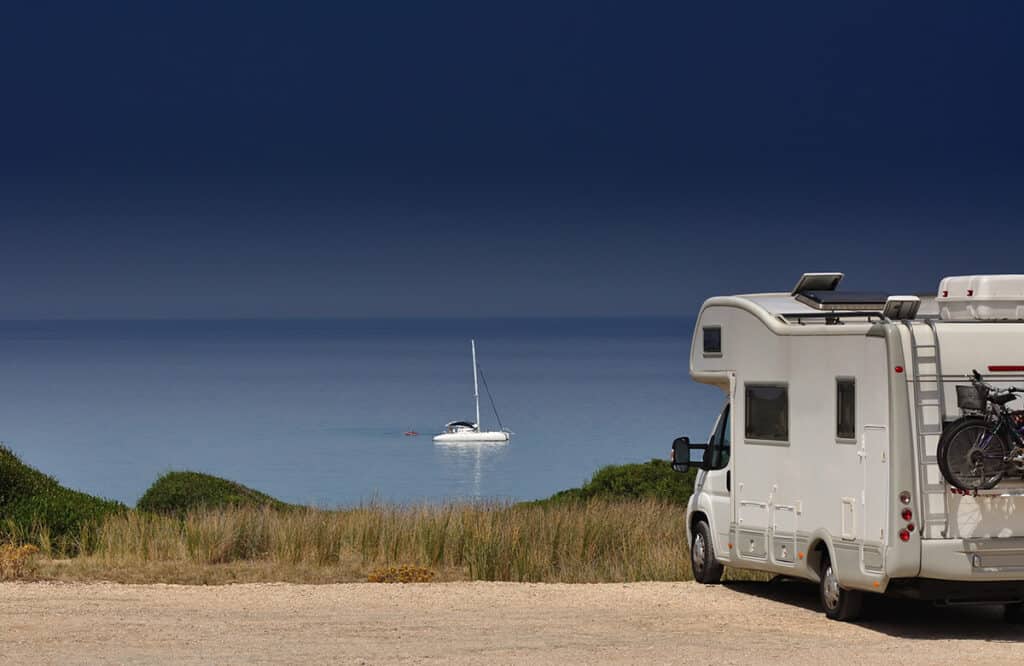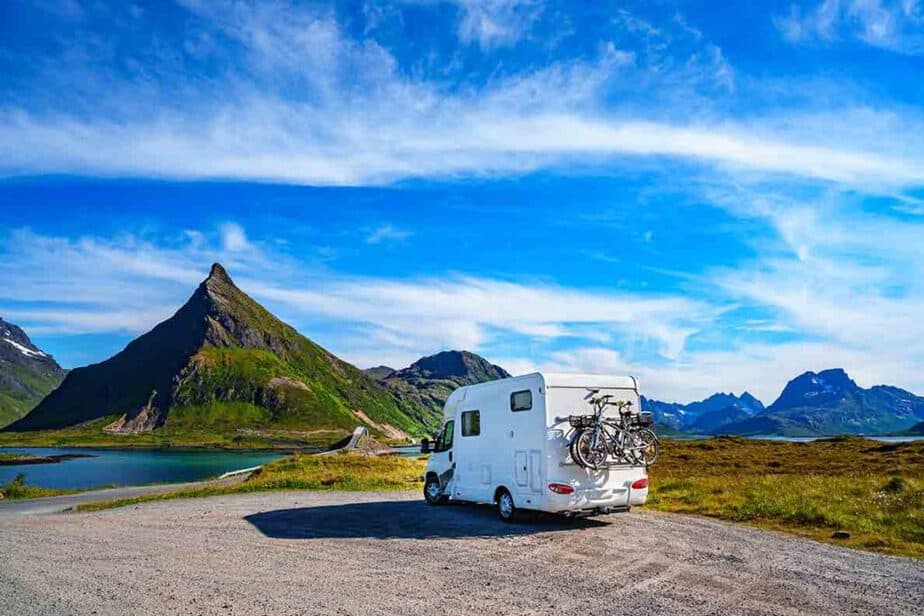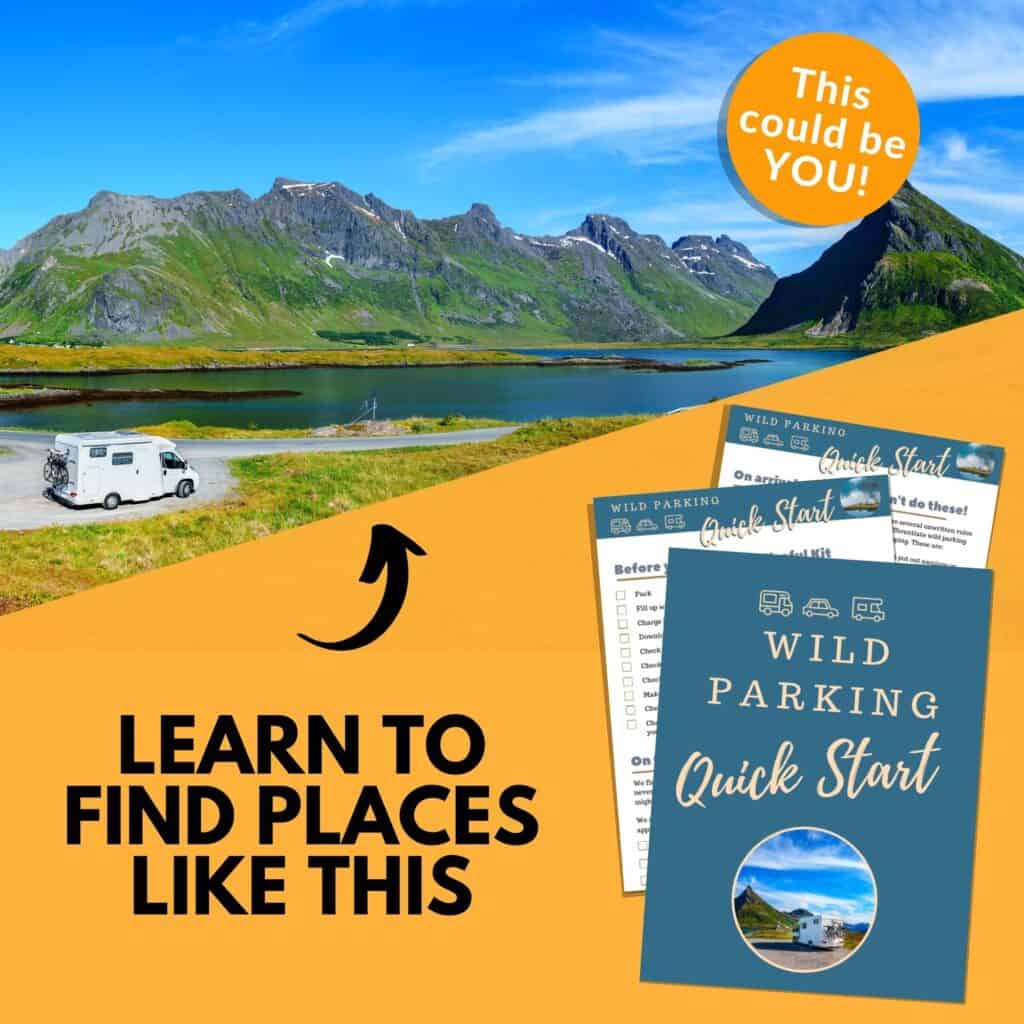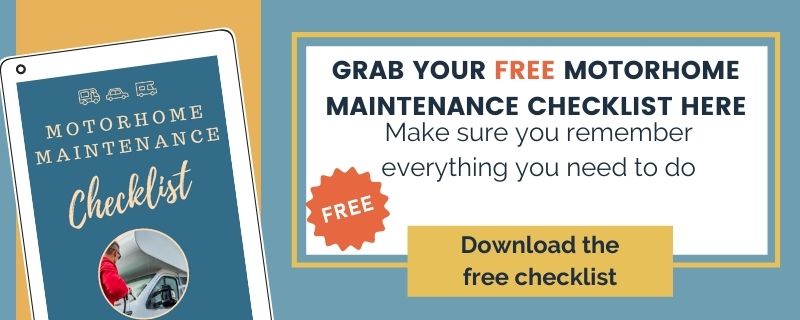Planning to visit Ireland with a motorhome or campervan? Want to get some tips for places to visit, where to stay, routes to take and more? Here’s everything you need to know about motorhoming or campervanning in Ireland.
Don’t forget to download your FREE motorhome travel checklist below to help you plan your Irish road trip.
*We work hard to make this the best motorhome blog and road trip website possible, full of helpful content for you. The website is supported by our readers, so if you buy through links on this site we may earn a commission- at no extra cost to you. All opinions remain our own.
If you find this post useful, you can also treat us to a coffee at the bottom of this page- we promise to enjoy it while creating more useful content like this- we might even indulge in a biscuit (or two!)
Campervanning in Ireland – why you should go!
As I write this, I’m sitting in my motorhome by a beach in the Republic of Ireland. Sure, it’s rainy, but that’s not detracting from the beauty of this country. It’s not called the Emerald Isle for nothing!
Put simple, Ireland is a beautiful place for a road trip. There’s so much history, beautiful roads and places to explore and plenty of hospitable places to find food and entertainment, both in Northern and Southern Ireland (which they prefer to call the Republic.)
You can of course explore Ireland using public transport, but it’s so much better if you have your own vehicle- whether that’s a motorhome or campervan (our preferred options), or a car, caravan or even motorbike.
One of the best things about being able to explore Ireland on a motorhoming holiday is that you can see the differences between the regions and really get a feel for the country in a short space of time. It can also make your trip cheaper if you can buy and prepare your meals instead of having to buy them all- not to mention being able to stay overnight at some breathtaking locations.
In this guide, we’re going to share with you everything you need to know to go motorhoming or campervanning in Ireland, including getting to Ireland from the UK (or elsewhere), planning your route, where to stay (motorhome campsites, alternatives or wild camping with your camper), some road trip ideas and places to visit, driving tips and other practical advice to help you have an amazing Irish road trip.
Don’t forget to grab your free motorhome travel checklist which will help you plan and organise everything you need.
Motorhoming in Ireland- When to go
Like most of the UK, the best time for a road trip is probably between April and October if you’re just considering the weather.
However, remember that it’s called the ‘Emerald Isle’ because it’s so green… and it’s green because it rains. A lot. Expect rain at any time of the year (yet another reason to be glad of your own vehicle… you can hide inside if the weather turns!) Of course, there are some sunny days as well, and you’re most likely to get those during the summer.
July and August are the main school holidays, so everything will be a lot busier then AND prices for everything will be higher- ferries, campsites and even some attraction fees.
Other major events in Ireland include the Rugby Six nations at the beginning of the year (which is mainly centred on Dublin), The Gathering- a traditional dancing and music festival held each February in Kilkenny and St Patricks Day on 17th March each year- the entire country celebrates it with a passion (celebrations often last a week!)
There’s also the Galway Food Festival in April, the Taste of Dublin food festival in June and National Heritage Week at the end of August, as well as many others.
So there’s never a ‘bad’ time to visit Ireland. If you’re able to travel outside of school holidays we highly recommend it, and you’ll never forget a St Patrick’s Day in Dublin! (Actually, that’s not strictly true; friends of mine moved to Dublin with their kids and I’ve spent many St Patrick’s Days there- I can’t seem to remember much of them at all… 😉)
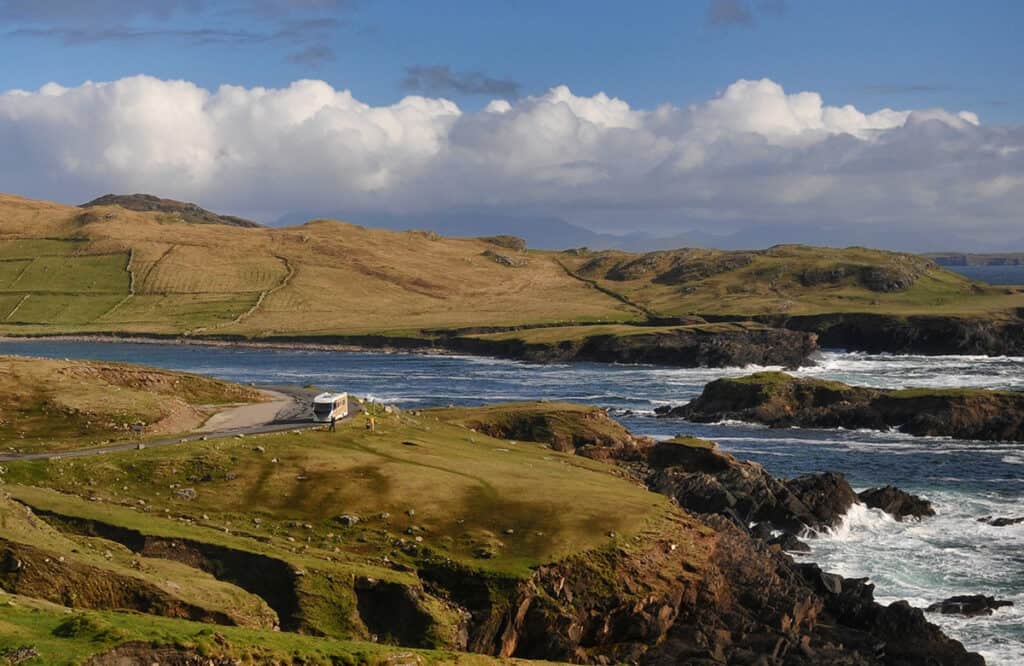
Highlights of an Ireland campervanning holiday
Some of the best places to visit in Ireland with a campervan or motorhome include:
- Cliffs of Moher – unbelievably dramatic
- The Wild Atlantic Way- 1700 miles of dramatic coastline and traditional Irish culture
- Giants Causeway (Northern Ireland)
- Dark Hedges road- famous as a Game of Thrones filming location. You can drive down it, but not in a motorhome!
- Dublin- one of our favourite cities in Europe
- The Ring of Kerry- one of the best road trips in Ireland
- The Rock of Cashel- Ireland’s most visited Heritage site
- Blarney Castle and the Blarney Stone
- Dunmore Head- mainland Ireland’s most westernmost point
- Torc waterfall- one of the best waterfalls in Europe
Talking of TV shows and movies, here are some of the biggest which were shot in Ireland:
- Harry Potter and the Half-Blood Prince (Cliffs of Moher, Lemon Rock)
- Star Wars: The Force Awakens/The Last Jedi (Skellig Michael island)
- Braveheart (yes, I know it’s about Scotland!)- Bective Abbey, Curragh Plains, Trim Castle)
- Saving Private Ryan Ballinesker Beach- the setting for the D-Day landings in opening 20 minutes
- The Princess Bride (Cliffs of Moher)
- Game of Thrones (see some guided tours here)
Of course, there are MANY other incredible locations and places to visit in Ireland- we can’t possibly list them all.
If you enjoy reading books before a trip, here are some we recommend:
See more fun and practical motorhoming books we recommend reading
Getting to Ireland from Britain with a motorhome or camper
Ok, before we go any further, let’s clear up the confusion.
- Northern Ireland IS part of the UK. The Republic of Ireland is not
- The Republic of Ireland is in the EU. Northern Ireland is not
- Great Britain (or Britain) refers to the landmass of England, Scotland and Wales
- The British Isles is the UK AND the Republic of Ireland (plus the Channel Islands, Scilly Isles and thousands of other small islands.) There’s an excellent article explaining it all here
However, even knowing all that, many people (myself included!) incorrectly say going from the UK to Ireland, when they mean from Britain. So, my apologies should I make that error elsewhere.
Crossing from Northern Ireland to Southern Ireland
To get to Republic of Ireland from Northern Ireland you… drive across the border. It used to be incredibly easy- it’s now a little harder thanks to BREXIT, but it’s still just a matter of driving south. There will be a border to cross and you’ll need to carry all the correct documents. Depending on your route, there may be a toll charge.
Getting to Ireland by Ferry from rest of the UK
For the rest of the UK (otherwise known as Britain!), if you want to take your own motorhome or campervan across to Ireland, you’ll need to get on a ferry. There are a few ferry routes to choose from:
- Holyhead to Dublin (Irish Ferries)
- Pembroke to Rosslare (Irish Ferries)
- Liverpool to Dublin (P&O Ferries)
- Cairnryan to Larne (P&O Ferries)
- Cairnryan to Belfast (Stena Line)
- Liverpool to Belfast (Stena Line)
- Holyhead to Dublin (Stena Line)
- Fishguard to Rosslare (Stena Line)
Getting to Ireland from France
There are also ferries which go directly from France to Ireland.
- Cherbourg to Dublin which usually runs 3 times weekly (Irish Ferries)
- Cherbourg to Rosslare once per week (Brittany Ferries)
- Roscoff to Cork twice weekly (Brittany Ferries)
- Roscoff to Rosslare once weekly (Brittany Ferries)
- Cherbourg to Rosslare which runs three times a week (Stena Line)
Travelling around Ireland
Once you’re over in Ireland, whether it’s North or South, the road system is very good and easy to navigate. We’ll talk more about the rules, speed limits and other things to know shortly.
New to motorhome or camper travel in Europe? You might find these posts helpful:
See all our Europe motorhoming posts here
NEED GEAR? If you need any kit or essentials for motorhoming in Europe, here’s what we recommend and where to find it
Hiring a motorhome to tour Ireland
Of course, if you don’t have or want to pay to take your vehicle to Ireland, or you’re travelling from further away, the easiest option is to fly in to Ireland and rent a motorhome or campervan to use during your stay. Just make sure to ask how to get from the airport to the rental agency- not all of them are at the airport itself and you might need to book a taxi.
The biggest airports in Ireland are:
- Dublin Airport – east coast
- Cork Airport – south coast
- Shannon Airport – west coast (near Limerick)
- Knock Airport – mid/ north West (but still in the Republic of Ireland)
- Belfast Airport – in Northern Ireland
To rent a vehicle in Ireland you must:
- be at least 21 years old, although many hire car companies have a minimum age of 25 (certain car categories may require older)
- There may be restrictions for over 70s as well
- have had a driving licence for more than one year
- show identification (identity card for EU citizens or a valid passport for other nationalities)
You can expect to pay around £100/ day for a campervan in June out of peak season- be sure to ask the right questions so you know what to expect from your motorhome or campervan rental
Bear in mind that you might need to pay an additional fee to drive from the Republic of Ireland into Northern Ireland (or vice versa) so check with your hire company before you book.
Don’t forget, it is YOUR responsibility to make sure the vehicle has the required safety equipment. The on-the-spot fines apply to you as the driver, not the company. Check in advance with the company what kit they will provide with the vehicle and what you will need to bring.
Take a list of what is legally required with you and check it off one by one as you are given the handover. Do not drive until you are happy you comply with the local laws.
Campervan rules in Ireland- what gear you need to carry
Things you need to carry to legally drive in Ireland
You’ll be pleased to know that, unlike motorhoming in France or much of the rest of Europe, Ireland is similar to the rules in the UK, so there are very few things you LEGALLY have to carry (although we recommend them anyway.) There are:
- UK sticker attached to the back of vehicle or reg plates (and trailer if you have one)
- A spare wheel (and tools to change it!), or a tyre repair kit.
- If you wear glasses you MUST carry a spare pair
- Crash helmets are mandatory for motorbike/ moped riders and passengers
NOTE: Hi-vis reflective jackets ,Warning triangles and Headlight beam converters (if you have a UK vehicle) are not required in Ireland. If you have a European vehicle (ie- you normally drive on the right), you will need headlight converters.
What documents do you need to road trip in Ireland?
If you’re driving in Ireland, you need to carry the following documents:
- Passport (or identity card)
- Driving licence (check it is in date!)
- Motorhome Insurance documents- check you are covered for driving in Europe
- Breakdown cover
- Vehicle V5 logbook (which must show your correct address)
- Vehicle must be legally taxed and MOT’d
- Trailer certification
- Green card (get from your vehicle insurer)
- International Driving Permit if required
- Personal travel insurance
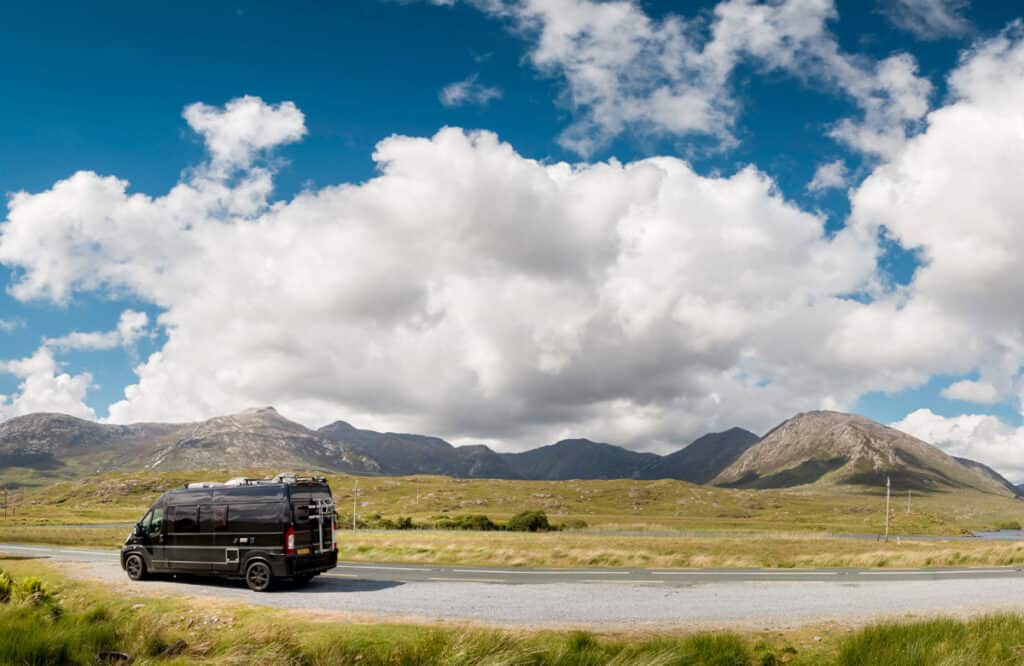
Do I need an international driving permit to drive in Ireland?
Most UK citizens do not need an IDP to drive in Ireland, as long as you have a card driving licence issued in the UK (in date, of course!)
You might need one if you have:
- a paper driving licence only
- a licence issued in Gibraltar, Guernsey, Jersey or the Isle of Man
(If you do need an IDP, here’s an in-depth guide on how to get an International Driving Permit and which one(s) you need from a UK post office.
Touring Ireland in a campervan- Other useful things you might need
We’ve been touring Europe in our motorhome for several years. We’ve tried all sorts of kit- some useful, some not so much.
Here is a list of things we highly recommend when motorhoming in Ireland, but which are NOT essential:
Motorhome Stopovers and Overnight camper parking in Ireland
Like most countries in Europe, there are several types of places where you can stop with your motorhome or campervan overnight in Ireland.
- Campsites
- Free/ approved motorhome parking schemes
- Wild Camping (we’ll talk more about the legality of that shortly)
Motorhome Campsites in Ireland
Campsites in Ireland are much like other campsites anywhere around the UK or Europe. Some are all-singing and dancing, with pools, entertainment and more, while others are more basic (and usually cheaper!) It’s pretty easy to find a campsite near to you or near to where you are going, especially if you’re a member of club or have a book!
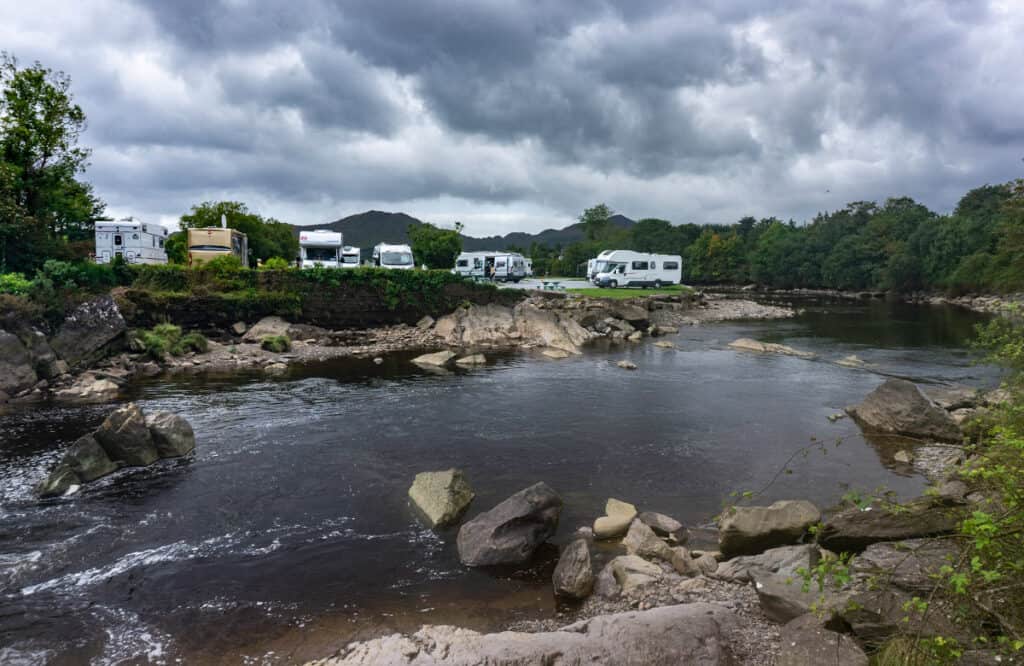
You normally don’t need to book in advance unless you’re visiting in peak season or during a festival (or over St Patrick’s weekend. Also, if you’re a member of one of the UK’s biggest motorhome clubs, they have some sites in Ireland which you can book through their systems.
Be aware that many campsites close for winter, some as early as September and don’t re-open until Easter. So do your research, especially if you’re travelling out of season.
TOP TIP: If you can travel outside peak times, use your ACSI Camping Card to reduce the cost of campsite stays
Aires in Ireland
Ireland, like the UK, does not have ‘aires’ in the same way you might be used to if motorhoming in France, Germany or Italy.
An aire is just an approved overnight motorhome parking area which isn’t a campsite. Ireland DOES have many places where motorhomes and campervans can stay overnight- with permission. But they don’t work in the same way as aires.
Approved overnight motorhome parking
There are several schemes which connect motorhomers and campervanners who don’t want to stay in campsites every night to businesses and places happy to allow overnight parking (usually without facilities). This is in exchange for you buying some of their products or services, such as a meal in a restaurant.
Safe Nights Ireland
One such scheme is Safe Nights Ireland– which has over 350 locations around Northern and Southern Ireland. You can join the scheme for just 15€ a year and get access to any places which are part of the scheme.
Pub Overnight Stops in Ireland
Pubs are a great option for a free overnight parking stop if you’re already going to eat at them. Many of them will allow motorhomes and campervans to stay overnight in their car parks (some even allow caravans). Obviously, this is only for the night- you probably wouldn’t be able to stay there for a week, although I suppose there’s no harm in asking!
READ MORE: How we find places for free overnight motorhome stopovers
Wild camping in Ireland for motorhomes and campers
Is wild camping for motorhomes and campervans allowed in Ireland? The legal answer is no- you’re not allowed to stay anywhere with a motorised vehicle apart from on approved campsites, unless you have the landowners permission.
However, in reality, many people do motorhome wild camping all over Ireland and rarely have a problem.
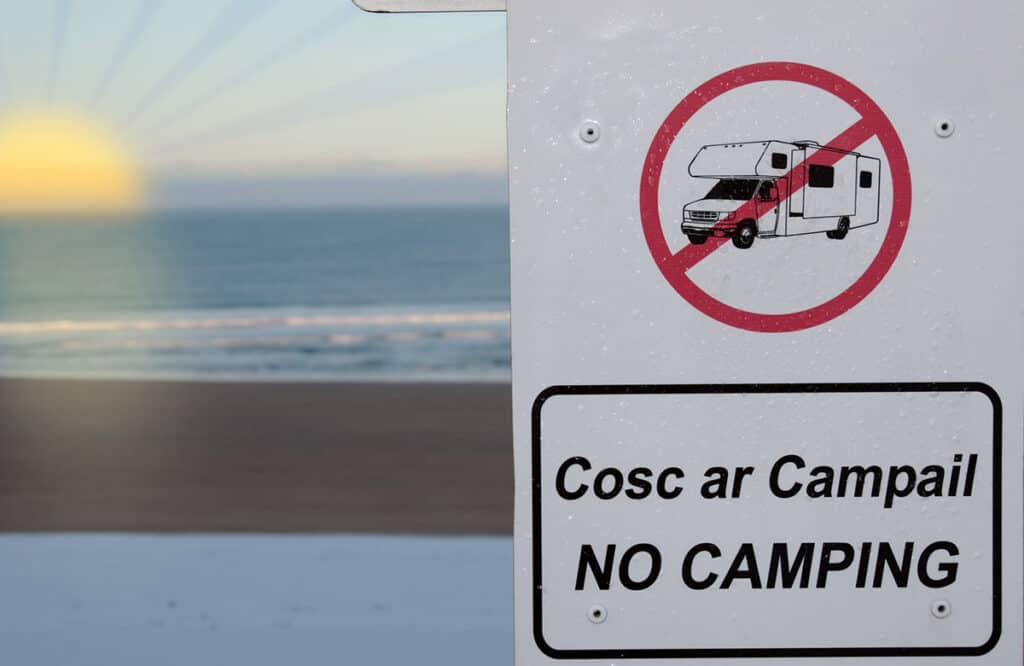
There is a difference between ‘camping’ and ‘overnight parking’. Many people (us included) incorrectly refer to parking up overnight somewhere as motorhome wild camping, instead of overnight parking.
Overnight parking is parking up for one night and then moving on again in the morning. No awnings, outdoor furniture, BBQs, motorhome generators, washing lines or anything OUTSIDE the vehicle. In many remote places, if you arrive late in the afternoon and leave early-ish in the morning, you’ll be absolutely fine to stay overnight, unless there’s a clear sign banning motorhomes or campers overnight.
For tips on how to park overnight without upsetting local residents or drawing unwanted attention, read our complete guide to motorhome overnight parking (which we call wild camping. Sorry)
Wild Camping is a different matter, and is forbidden in Ireland. You will probably be asked to move on and/ or fined by the Police if you look like you are camping with your van.
Remember, you can always ask if you’re allowed to stay. The Irish are incredibly hospitable and if you’re polite and respectful, they’re very likely to allow you to stay without issue (especially if you’ve just paid money to them for something!)
Motorhome and campervan service points in Ireland
Unlike in Europe, there are very few places to discharge waste and water and refill with fresh water apart from on the campsites. For this reason, it’s worth booking into a campsite for a night every few days, in order to use its services.
Some campsites will allow you to pay a small fee and use the services without paying for an overnight stop- you’l have to ask as you go.
Driving tips for Ireland
Some useful tips for driving in Ireland, whatever your vehicle. Ireland has a fairly good road network, especially around the major towns and cities. However, some of the smaller rural roads can be VERY narrow and many are marked as unsuitable for larger vehicles, like motorhomes.
Often, these small roads are single track, and have passing places. These are places to pull in to let another vehicle go past from the other direction, NOT somewhere to park up and go for a walk.
Also, expect slow-moving farm vehicles on these roads- it can take a while to get anywhere and no-one in Ireland is in much of a hurry. So don’t over-estimate how far you can travel in one day. Also, expect sheep, cows and other animals to wander out into the road in front of you at any moment.
- Drive on the left (like in the UK, the opposite to most of Europe)
- Stay to the left on roads with more than one lane and overtake on the right.
- At roundabouts and junctions, traffic already on the road and coming from the right has priority.
- Motorways are marked with an ‘M’
- Seatbelts are compulsory for front and rear passengers
- All children up to 135 cms in height or up to 12 years of age, must use a suitable child seat (Northern Ireland)
- Handsfree kits are required if using a mobile phone
- Devices warning of speed cameras are forbidden
- Dipped headlights are to be used during poor visibility.
- Motorcycles must use dipped headlights during the day at all times.
Speed Limits in Ireland
IMPORTANT: The Republic of Ireland drives in km/h (like most of Europe). Northern Ireland drives in mph (like the rest of the UK). If you change the settings on your motorhome sat-nav, remember to change it if you cross the border!
Breaking the speed limit in either Northern or Southern Ireland will result in a fixed penalty and/ or penalty points on your driving licence.
On the spot fines are rare, but it is possible to be pulled over by the police force for speeding and given a fixed penalty notice and/ or plus a £100 fine.
Republic of IRELAND
Speed Limits for vehicles under 3.5t are as follows (unless otherwise signed!)
- Motorways- 120km/h (74mph)
- National roads/ dual carriageways- 100 km/h (62 mph)
- Regional roads- 80km/h (50mph)
- Built up areas- 50 km/h (31 mph)
Speed limits for vehicle OVER 3.5t
- Motorways/ – 90 km/h (55 mph)
- National roads/ dual carriageways- 80 km/h (50 mph)
- Regional roads- 80km/h (50mph)
- Built up areas- 50 km/h (31 mph)
Speed limits in Northern Ireland
- Motorways/ – 70 mph (
- National roads/ dual carriageways- 60mph
- Built up areas- 30 mph (50kph)
Speed cameras in Ireland
There are both static and mobile speed cameras in Ireland. The mobile ones are mostly in vans which are moved around as the Irish police force (Garda Síochána) see fit.
Drink driving laws
The Republic of Ireland has stricter drink driving laws than Northern Ireland, only allowing 50 milligrammes of alcohol in 100 millilitres of blood (the UK and Northern Ireland is 80). As always, don’t drink and drive. If you are a new or a professional driver, the levels are even lower.
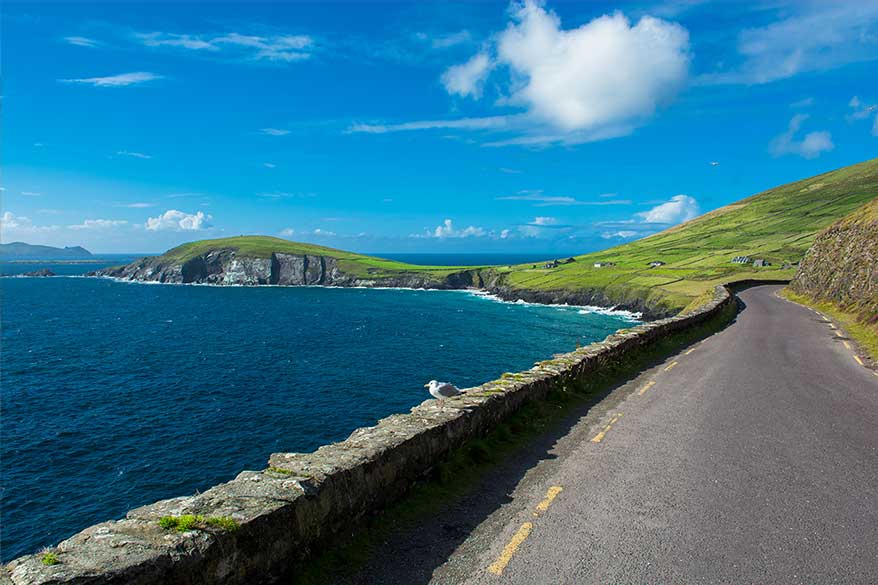
Tolls in Ireland
There are currently no toll roads in Northern Ireland.
There are 11 toll roads in the Republic of Ireland- not as many as you might be used to in France (and luckily not as expensive as Norway!) You can see where they are here.
You can pay for the tolls using cash at the toll plazas (cards are accepted at a few but not all). Alternatively, you can sign up for a TollTag account and that will charge you as you drive.
The only road where you cannot pay as you drive is the M50. The M50 works a bit like a Dartford Tunnel- you need to pay for using it by 8pm the following day. You can pay at many garages and shops in the area, but the easiest way is online here.
If you are renting a vehicle, you will need to ask them how to pay for tolls/ the M50 but its common for you to need to pay yourself.
Petrol/ Diesel in Ireland
There are plenty of fuel stations across Ireland. As with everywhere, you’ll find the prices slightly higher on the motorways.
Petrol is Unleaded (95 / 98) – Green handles on pump
Diesel has black or yellow handles on pump
Some places are 24h pay at the pump, but may require you to go into the shop and pay the cashier either in advance or after you’ve filled up- there will be a sign to tell you what to do. (Leave your car in front of the pump and make a note of the pump number.)
You can pay using cash or a credit card. Many places do NOT take American Express. You can use your UK cards without a problem.
Parking in Ireland
Many places which allow parking during the day or night require payment. Usually you need to pay at the ticket machine display your parking ticket in the windscreen. Not doing this is likely to result in a fine.
Parking is prohibited when the road is marked with a red line or a double yellow line.
A disadvantage of a campervan in Ireland is that parking in cities and towns can be tough- many places have height barriers of around 2.5m (and most vans and motorhomes are taller than that!) Therefore, you would need to find on-street parking in the town, which can be difficult. Alternatively, park up or use a campsite nearby and use public transport to get in.
Getting LPG in Ireland
LPG (GPL) can be found at selected petrol stations and at autogas stations. If buying from a petrol station, you may need to wait for an attendant to turn the system on for you.
You can find places which sell LPG using MyLPG.eu Ireland mostly uses the ACME connector.
LEARN MORE: Learn how we find LPG in Europe for our motorhome
More useful things to know when campervanning in Ireland
Some more tips to help you enjoy your time touring in Ireland.
Emergency Numbers: 112 will get you everything. 999 works as well.
Language– Irish Gaelic and English
Currency– Euros in the Republic of Ireland, GBP (British Pound) in Northern Ireland
Cards– most major credit and debit cards are accepted. American Express is only taken in large stores (often not at fuel stations)
Timezone– GMT (or the same as Britain) Ireland follows Britain in terms of moving forwards or backwards for summer time
Mobile Phone and Internet – You should be able to use your UK mobile and data without any issue in Ireland. If in doubt, check with your provider before you travel.
Tipping- It’s normal to leave around 10-15% of your bill as a tip after eating a meal in a restaurant. A tip for a barman is always appreciated (and can get you access to some hidden whiskies!) Tips for cab drivers and other services are also appreciated.
Shops– Neither Northern Ireland or the Republic of Ireland are particularly expensive in terms of food or goods- it’s about on par with the rest of the UK and you’ll see many of the same shops, especially in Northern Ireland. Tesco and Lidl are common.
The Republic of Ireland is staunchly Catholic and you may find many shops closed on Sundays and religious days. Some of the larger supermarkets and garages may be open for a few hours. Most shops close between 5pm-7pm during the week- supermarkets may be open as late as 10pm.
Northern Ireland follows the UK, so shops are often open 10-4pm on Sundays and close between 5pm-7pm during the week.
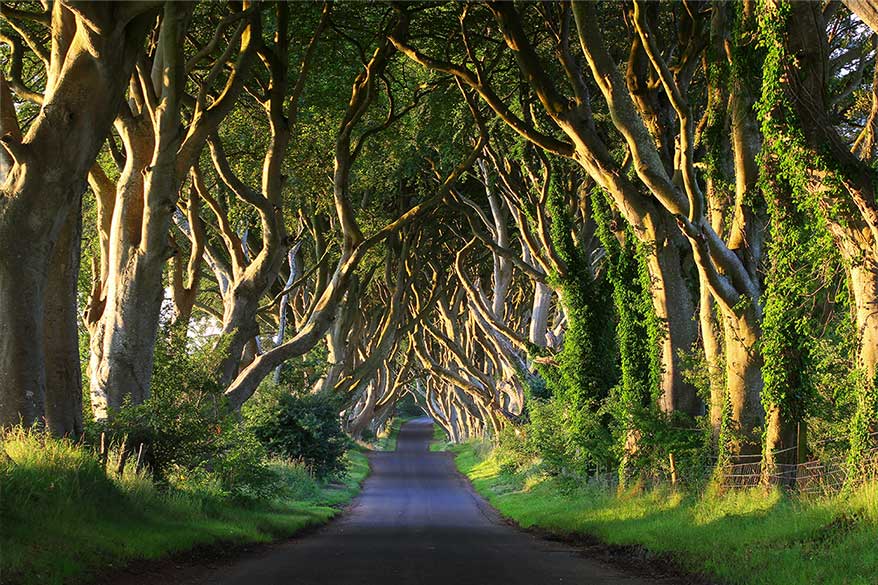
Campervanning in Ireland- security
Ireland, like the UK, has good areas and not-so-good areas in terms of crime rates. Vehicle break-ins do happen, as do petty theft and pickpocketing.
We highly recommend paying extra attention to your motorhome security when travelling in Ireland. You might even wish to fit an extra camper habitation door lock and never leave your vehicle unattended in an unsecure area.
READ MORE: Essential tips for protecting your van at home and on the road
Touring Ireland with a dog
Sadly, both Northern and the Republic of Ireland are not particularly dog-friendly, although some areas are better than others. Most places do not allow dogs into restaurants, cafes or pubs, although they do allow you to sit outside.
You might be allowed to take them on a train, but most buses ban all but the smallest lap dogs. They are allowed on beaches out of season, but during summer they are banned.
Having said all that, there are some INCREDIBLE places to walk your dog, so if you’re not fussed about eating out or using public transport, then you’ll have no problem with your dog in Ireland.
Getting to Ireland from Britain with a dog
Now that BREXIT has been and gone, the rules for entering Ireland with a dog have changed.
In order for your dog to travel into Ireland, you will need:
- A Microchip
- A rabies vaccination (you must wait 21 days before travel)
- An Animal Health Certificate (or Pet Passport for European pets)
- A Tapeworm treatment, administered 1-5 days before travel by an approved vet. (Note: you do NOT need tapeworm for going from Ireland to Britain)
You shouldn’t need to do anything to take your pet from Northern Ireland into the Republic of Ireland, or vice versa. For the most up-to-date information, check the Deara website
Using a Drone in Ireland
You can use a drone in Ireland, but there are certain things you need to do first.
READ MORE: What’s the best travel drone (and how to choose)
To use your drone in Ireland you need to register here (unless your drone weighs less than 250g!) If you do not do that, you must not fly higher than 15 meters.
Drones and similar remote-controlled flying devices must be kept at least a minimum 30m from people, vehicles and buildings that are not connected with the drone operator. Flying must happen in daylight only, below 120m and never fly closer than 5km to airports. The drone must always remain within the sight of the operator.
Please check for local regulations and military or other special restricted areas where all the aforementioned activities are forbidden by law.
